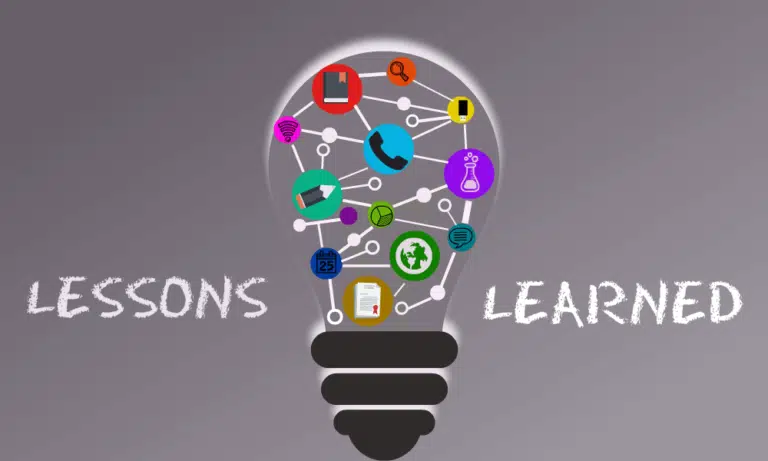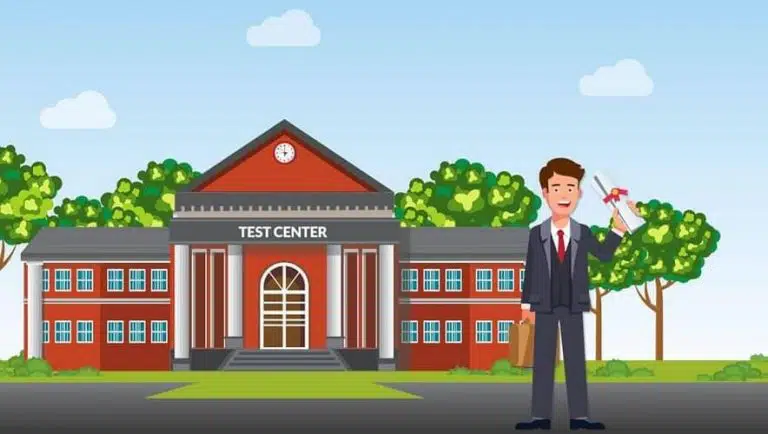Today we will discuss lessons learned in project management.
Every project is an opportunity to gain new experiences. This experience provides you with lessons that will be beneficial to future initiatives.
Lessons learned are part of organizational process assets and assist the project management team and the project management office (PMO) learn from the experience of previous projects.
Lessons learned help in:
- Avoiding repeating mistakes
- Using best practices
- Taking advantage of opportunities
- Improving project quality
Lessons Learned
Definition: Lessons learned are documented knowledge gained from previous projects in such a way that it can help future projects.
Lessons learned are collected throughout the project life cycle and contain all events, both positive and negative. The goal is to reuse the best practices and avoid the same mistakes in future processes and projects.
The PMBOK Guide defines the lessons learned process as a “collection of interconnected actions and activities undertaken to accomplish a specified set of goods, results, or services.”
How to Collect Lessons Learned in Project Management

The lessons learned collection process involves five steps.
- Identify: Make a list of comments and suggestions. These can be sources of information for future initiatives.
- Document: Record all information, discuss it and highlight the lessons learned during the conversation.
- Analyze: Analyze and arrange the lessons learned. They could be used in training or to enhance project management processes.
- Store: Keep a copy of the lessons learned reports on a shared disk or in the cloud to be accessible to all project teams.
- Retrieve: You can retrieve the lessons learned from the archive to be used for your current project.
Importance of Lessons Learned
Lessons learned are important because:
- They help you learn from your mistakes, and then you can stop the same issue in the next project.
- They allow you to collect best practices for doing tasks and pass on this information.
- They help stakeholders, and team members develop trust.
You should clarify that this exercise is not to express personal rage.
You should welcome positive criticism, as the lessons learned exercise is about giving useful and constructive criticism to improve processes and avoid previous errors.
How to Document Lessons Learned in Project Management
The following are a few methods to collect and document project lessons learned.
Post-Project Reviews
In a post-project review, you evaluate what worked and what didn’t. You can have an open and honest conversation about the project and then use this knowledge for your next project. Afterward, you can archive the results for future reference.
One-On-One Meetings
Meet one-on-one with your team members and ask for their lessons learned. You may discover that team members are more willing to offer feedback during these personalized meetings, and you may collect some valuable ideas.
Team members will discuss the accomplishments in a group discussion but may not admit mistakes. In a one-on-one meeting, individuals are less concerned about others overhearing their faults; they will speak freely.
Team Meetings
You shouldn’t wait until the end of the project to compile the lessons learned. Make it a regular exercise to record lessons learned. Inquire about what team members have learned during the week and discuss it in an open environment. Record it.
You may not get useful lessons learned in every meeting, but the process creates an environment where team members are encouraged to share their lessons learned.
Wikis/ Software
Encourage your PMO to create a wiki for lessons learned if it does not exist. They’re simple to develop and allow all team members to contribute. Keep the wiki updated throughout the project life cycle. You may also include copies of project documents such as post-project review minutes.
This makes a wiki a useful learning resource.
Lunch Sessions
Team meetings are useful with team members, but lunch sessions have a larger audience.
You conduct these sessions during lunch and let team members from other projects in your organization join. This helps share knowledge across different teams.
Lunch sessions are informal meetings.
When to Document Project Lessons Learned
You should document lessons learned throughout the project life cycle.
Capturing lessons learned is a continuous process. You should encourage team members to share lessons learned whenever possible. They should not wait for a specific time but record the lesson as soon as they learn it.
Team members often don’t report negative events. You should emphasize documenting negative lessons learned, as you may repeat the same mistakes if you do not learn from them.
After collecting lessons learned, you should analyze and modify them before archiving. You can add a summary of lessons learned in a few phrases. The summary can include information on the lesson learned, its importance, and how it can be helpful for future projects.
The lessons learned should include searchable keywords, such as “testing” or “specifications.” This will help searchers find the lessons learned related to particular terms quickly.
Lessons Learned Report
At the end of the project, you will prepare a report containing lessons learned with additional feedback and ideas from team members and send it to all stakeholders to provide their comments.
After receiving their comments, you will compile them and complete the lessons learned.
The lessons learned report includes:
- Summary: A one-page summary of the results with recommendations.
- Executive Report: A review of the lessons learned, including what went right or wrong and how you can improve processes.
- Findings: A summary of problems discovered throughout the evaluation.
- Recommendations: Actions to be taken in the future to avoid negative events and realize opportunities.
The project manager can deliver a report or the executive report depending on the audience. You can use newsletters, presentations, white papers, and other kinds of communication to share the lessons learned with project stakeholders.
How to Use Lessons Learned
The project manager usually conducts review meetings and presents lessons learned.
To effectively use lessons learned, your team should have access to this document while developing the project management plan.
The lessons learned should be from a similar project or a similar process so team members can easily co-relate and take preventive action to avoid making past errors.
Things to Consider from Lessons Learned
- What Went Well? – This includes positive experiences. If you don’t look at what went well, you may ignore using these proven strategies to realize opportunities in future projects.
- What Did Not Go Well? – This includes negative experiences. Learning from the mistakes becomes an essential aspect. Ignoring what went wrong ensures that you will repeat the same mistake.
- What Were the Anticipated Project Events? – Look at the anticipated project events and evaluate how they occurred. Learning takes place during and after each project. The most effective method is to host a meeting to discuss the lessons learned throughout the project lifecycle.
- Were the Project Milestones Met? If Not, Why? – Project milestones are important events in the project. You must review if the project milestones were achieved on time. If not, examine the reasons so you can take preventive action and stop it from occurring in your next project.
Lessons Learned Experiences
Approach with the right attitude while preparing the lessons learned and keep the following points in mind.
Don’t Get Caught up in Past Mistakes: Don’t be obsessed with past project issues, such as a disagreement with a stakeholder or a task you failed to complete. While this can be reasonable, it is unproductive. Accept whatever unpleasant things have happened and concentrate on what you have learned.
Stakeholders Always Criticize: Even the finest project managers are subjected to criticism. This is because projects are constantly met with opposition and debate inside the organization. As a result, others will point out what you should have done differently. They won’t praise you for things you did brilliantly.
Be Willing to Learn: Accept that you may not always have the greatest solution. Certain project activities may be better planned or carried out more efficiently. You will improve if you are willing to learn.
Examples of Lessons Learned
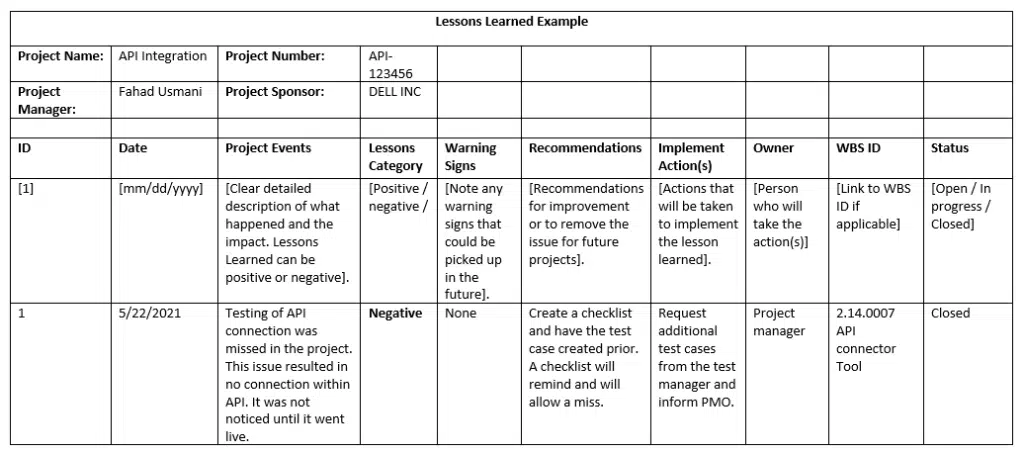
The goal of the lessons learned process is to learn from mistakes and achievements.
The goal of the lessons learned process is to learn from mistakes and achievements. The following are a few examples of lessons learned.
Lessons Learned for the Project Manager
- Lack of Support: If your team believes you are not supportive of client-related issues, you should make yourself available and assume leadership.
- Lack of Communication: Some issues might arise because of a lack of communication. Be proactive and ensure that all stakeholders are well communicated with and informed.
Lessons Learned for the Team
- A Lack of Team Spirit: This phenomenon is common for new teams. An informal gathering will help team members get to know each other and address this issue.
- Knowledge Sharing: When junior team members do not receive support from seniors, knowledge sharing becomes an issue. The problem can be solved by designating senior team members to mentor new team members.
- A Lack of Specialized Knowledge: Assume you’re working on an IT project in the oil and gas sector but don’t have any experts from the industry. Communicate with your organization to provide subject matter experts to support and help solve this issue.
Lessons Learned for the Company
- Lack of Organizational Alignment: Every department has its own goals; they don’t appear to be aligned with each other. This lack of alignment should be addressed from the top level.
- Weak Organization Culture: Weak corporate culture, such as criticizing employees, instills fear in employees. Management must support an environment that fosters an atmosphere where team members can take responsibility without fear.
- Corporate Travel Policy: A corporation’s travel policy can be restrictive. Such limitations might make an already difficult and unpleasant work trip even more difficult. Loosen such tight policies.
Lessons Learned Template
Tracking lessons learned and making improvements without a defined documentation procedure is difficult. Establish a procedure starting with the kick-off meeting and documenting lessons gained throughout the project’s lifespan will prevent employees from forgetting what they’ve learned.
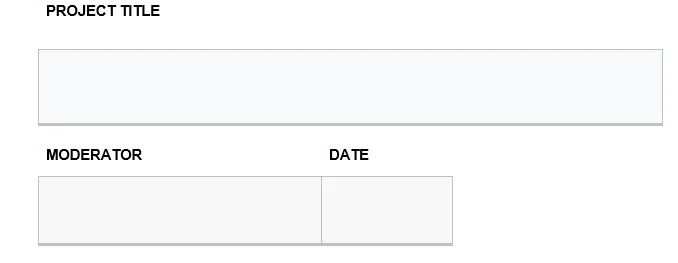
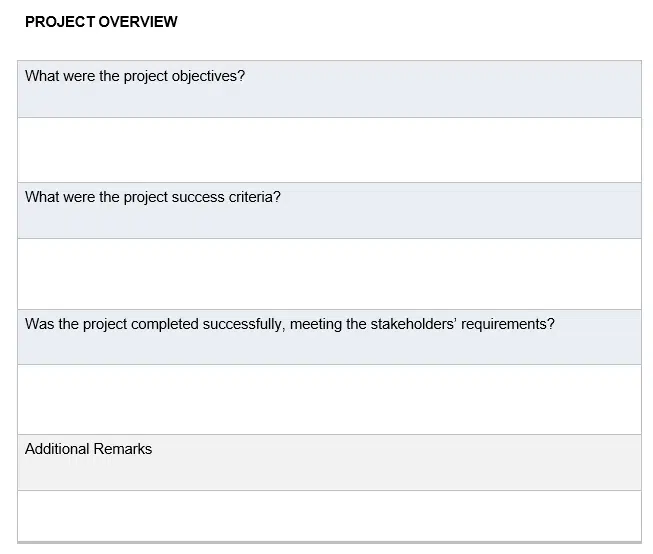
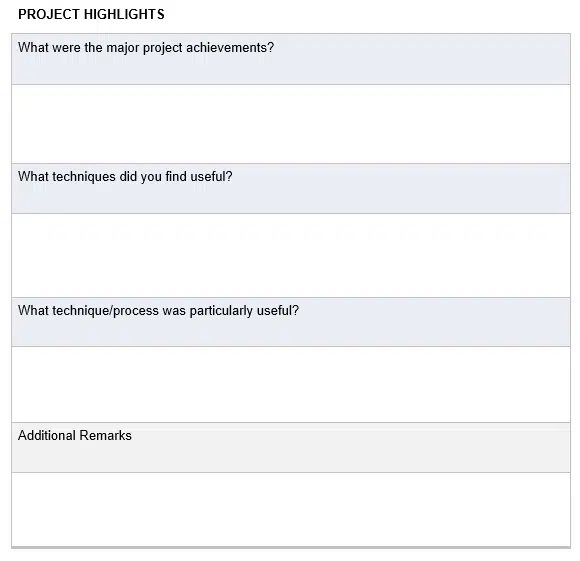
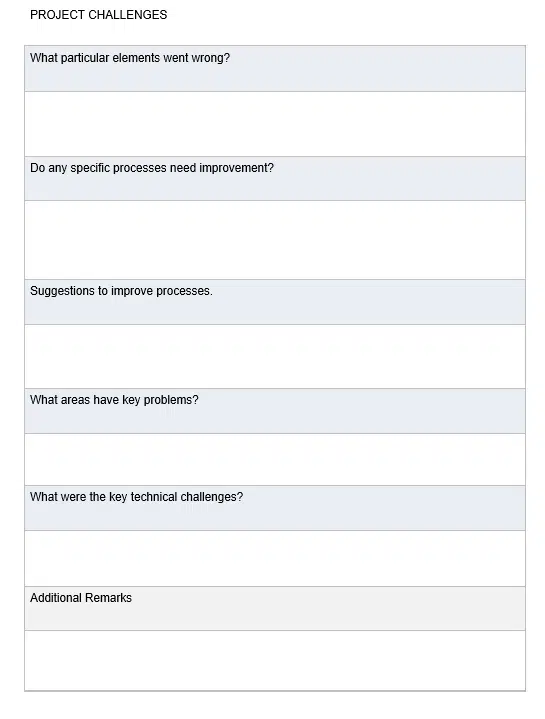
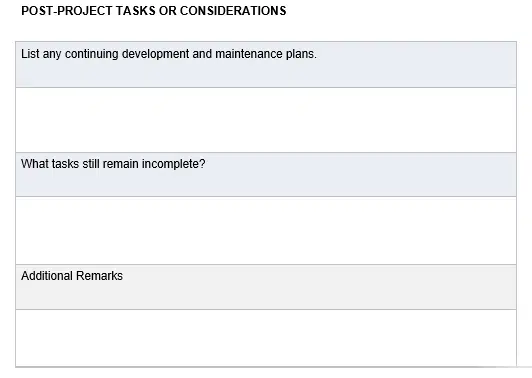
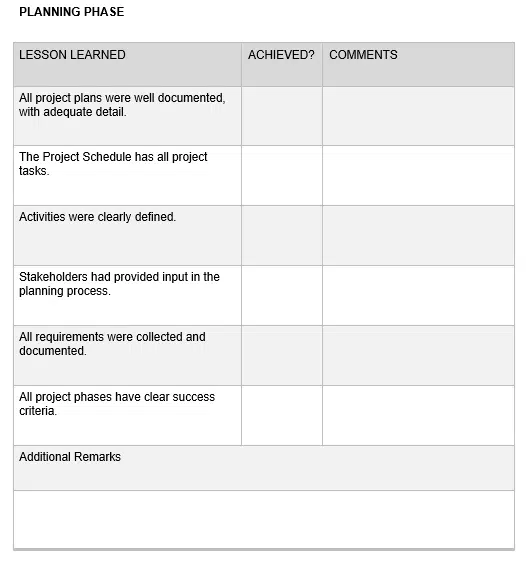
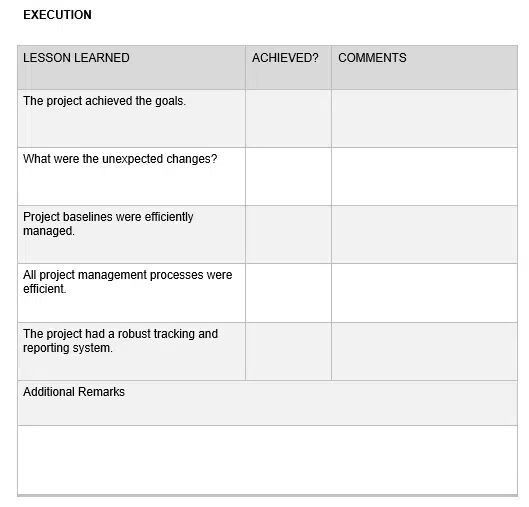
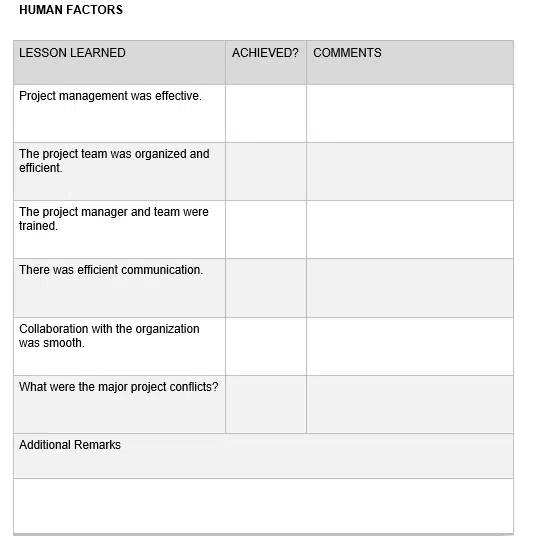
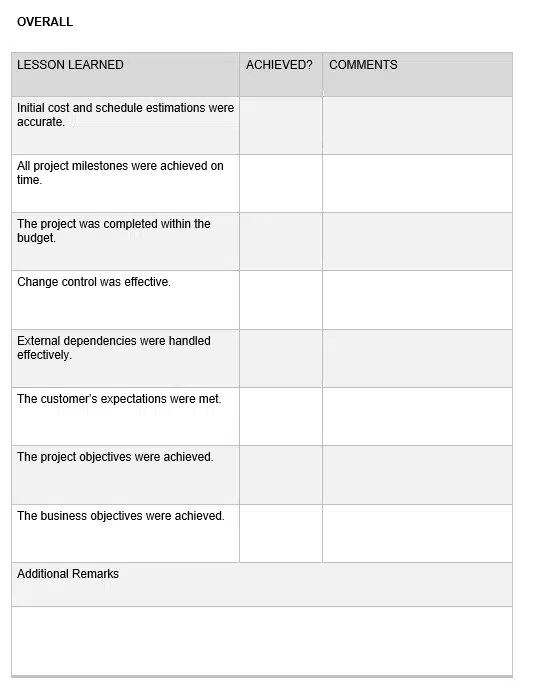
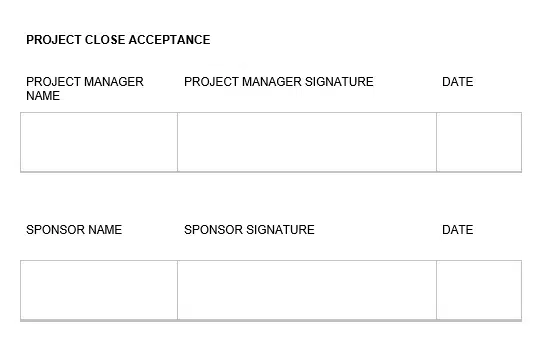
Summary
Lessons learned in project management is an effective approach for generating knowledge from experience. However, collecting lessons learned is not as easy as it seems because no one likes to pinpoint their faults and let others advise how they could have done it better.
Taking a critical review is vital for effective project lessons learned. Therefore, it is your responsibility as a project manager to build confidence in your team members so they can speak their minds freely. Also, make sure that no one blames other team members for any past errors.
How are lessons learned collected in your project? Please share your experiences through the comments section.

I am Mohammad Fahad Usmani, B.E. PMP, PMI-RMP. I have been blogging on project management topics since 2011. To date, thousands of professionals have passed the PMP exam using my resources.


